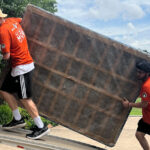Here is the super awesome checklist that covers absolutely everything you will need to do or at least consider to make your move as smooth as possible. We have grouped the items into time blocks leading up to your move in order to break up the tasks and make sure you are getting some of the important things done first. Happy planning!
Two Months Before Your Move
- Prepare a Budget — Create a moving budget spreadsheet to keep track of expenses.
- Book a Mover — The earlier you get a quote, the better chances you’ll get the date you want (or need).
- Get Insured — Confirm that your movers are insured.
- Book Off Moving Day — Notify your place of work that you plan to supervise the move and therefore need the day off.
- Contact Your Kid’s School — Make sure they’re all set up with their new school and have a start date.
- Prepare A Moving Plan For Special Items — (e.g. fragile stuff, pianos, hot tub, etc).
- Take Inventory Of Valuables — Start an inventory sheet for valuables before you move.
- Streamline Your Closet — Turn the hangers in your closet around. If, after a month, you haven’t worn certain items (their hangers will still be backwards) consider donating those items.
One Month Before Your Move
- Organize School Records — Go to your children’s school and arrange for their records to be transferred to their new school district.
- Use it or Lose it — Start using up things that you don’t want to move, like frozen or perishable foods and cleaning supplies. Consider a Goodwill or Salvation Army run for the random stuff. Donate large furniture items to Habitat for Humanity or a consignment shop. Remember the more you get rid of the cheaper the move!
- Take Measurements — Check room dimensions at your new place, if possible, and make sure larger pieces of furniture will fit through the door.
- Take Inventory Of Electronics — Take inventory of all electronics and take a photo of the setup (so it’s easier when you unpack).
- Order Supplies — Unless we are packing you ourselves it is time to order boxes and other supplies such as tape, bubble wrap, and permanent markers. There are a few options but ecobox (Austin, San Antonio) is great for cardboard boxes and other supplies while bronko box (Austin) and bungo box (Dallas) are great options for crates (only good if you are willing to unpack relatively quickly). Now is also a great time to plan that packing party (if you are into parties).
- Painters and Repairmen — If you’re thinking about repainting your new digs, try to give yourself a few days before you have to be out of your old place as you’ll need time to let primers, first, and seconds coats dry before you push furniture against the walls. Also, minor repairs are usually easier with no furniture blocking you. More tips here.
- Schedule Elevator Time — If you’re moving into an apartment, find out if there are any moving day requirements and book the elevator if necessary.
- Service Your Vehicle — If you’re moving across state or at least a couple of hours away, have your vehicles serviced.
- Create A Packing Schedule — Plan your packing schedule to get organized and start labelling boxes or areas of your home for items.
- Book Storage — If you are planning on going into a storage unit now would be a good time to arrange for that. One of the best places to shop around and make arrangements is here.
Three Weeks Before Your Move
- Do a Change of Address — Go to your local post office and fill out a change-of-address form, or do it online here. Just in case there are a few that slip through it is always wise to ask a close neighbor or possibly the new resident to look out for mail after you’ve moved. It may be a good idea to check in with him or her every couple of weeks after the move for the first month.
- Notify Friends and Family — Also a good idea to send a change of address postcard or email to all your friends and families notifying them of your new address!
- Notify Other Important Parties — Alert the following of your move: banks, brokerage firms, your employer’s human resources department, magazine and newspapers you subscribe to, and credit card, insurance, and most important… utility companies and cable companies!
- Forward Medical Records — Arrange for medical records to be sent to any new healthcare providers or obtain copies of them yourself. Ask for referrals or check yelp!
- Board Pets/Arrange for Babysitter — This is not an absolute must but can sure make things easier!
- Confirm Parking — Make sure you have a legal parking spot at both locations for moving day.
- Gather All Important Documents In One Place — This includes financial statements, legal papers, passports, birth certificates, and more.
- Notify Your HOA (Homeowners Association) — Let your HOA know about your move (if you haven’t already).
- Book Your Cleaners — Find and book a cleaner if you plan to use a professional service for your move-out or move-in clean. If you’re not using a cleaner, make sure you have a couple of friends or family members lined up to help you on moving day.
Two Weeks Before Your Move
- Begin Packing — Start packing the things that you use most infrequently, such as the waffle iron and croquet set. While packing, note items of special value that may require special care. Check out our blog on packing to make sure you are doing it like a pro (and thus reducing your chances of finding broken items when unpacking). Print it out, study it, and make both of our lives easier.
- Pack An Essentials Bag (or Box) — Leave items out for an essentials box with everything you’ll need for your first 24 hours in your new home.
- Back-Up Your Computer — Make sure everything important is saved somewhere on a hard drive or in the cloud.
- Pack Your Valuables In A Safe Box — Use your inventory list for valuables that include items such as jewelry, expensive purses, small but precious family heirlooms, moon rocks, important files, or any other small valuables into a safe box (or boxes) that you will personally transport to your new home.
- Get Antiques Appraised — If you have antiques or valuables being moved, have them appraised and advise your moving company in case extra insurance is required.
- Label Everything — clearly label and number each box with its contents, if it is fragile or not, and the room it’s destined for. These markings should be on both the top and at least one side so you can tell what is in them even if the boxes are stacked. Consider color-coding box labels, i.e. orange = kitchen, blue = bathroom.
- Fix Minor Repairs — Take care of any minor repairs that need to be done before you move.
One Week Before Your Move
- Refill Prescriptions — Stock up on prescriptions you’ll need during the next couple of weeks.
- Pack your Suitcase/Emergency Bag — Aim to finish your general packing a few days before your moving date. Then pack suitcases for everyone in the family with enough clothes to wear for a few days and your essentials that you will need right away like toiletries, a roll of toilet paper, and that Roku or Chromecast so you can make sure you don’t go into Real Housewife withdrawals. Make sure to let your movers know about these boxes or suitcases so they can make sure they are accessible immediately after the move.
- Clean Out Your Safe Or Safety Deposit Box — If you will be changing banks, remove the contents of your safe-deposit box and put them in the safe box that you’ll take with you on moving day.
- DON’T Go Grocery Shopping — Try not to do any grocery shopping several days before leaving. Unless you’re just moving a few minutes away most items in the fridge or freezer will have to be tossed.
- Washer and Dryer — If you have a front-loading washer try and find the shipping bolts (bolts that go into the back and keep the drum stable while in transit). Have them ready for the movers. Also, check to see if the electric plug for your dryer matches the one at your new place. If not, new ones can be purchased at any home improvement store. Consider replacing old dryer hoses during the move as well (also can be purchased at a home improvement store).
- Remove The Trash — Set up trash removal and recycling for your new home, and cancel your current service.
- Empty the Attic — Both so you don’t forget those items but also because most movers will not be allowed to take items down from the attic for you due to liability reasons.
Last Few Days Before Your Move
- Defrost The Freezer — If your freezer is moving with you, make sure to empty, clean, and defrost it at least 24 hours before moving day.
- Empty Your Refrigerator — The refrigerator needs to be emptied but, unless you are moving into storage or something, you can unload it at the last minute into coolers. We can put it on the truck last so it comes off first and you can get those food items back into the refrigerator as soon as possible.
- Plan for the Payment — If you haven’t already arranged to pay your mover with a credit card then make sure to cash for payment and tip (we don’t accept checks). A typical tip is 10% to 20% like most service industries. If you are moving out of town and plan on paying with a credit card it is a good idea to alert your credit card company that you will have a new charge coming through in a different zip code than normal. Sometimes card payments will be denied for security reasons if they are not alerted beforehand.
- Be Ready for the Cable and Internet Installer — Keep your tv, power cord and internet modem handy on move day (include it with the first load so it is accessible right away) if you are having cable and internet set up on move day.
- Avoid Heavy Mattress Flipping — Keep your bed skirt handy and make sure to put it back on after the movers bring in the box springs and BEFORE they put the mattress back on the bed. No need to move it twice.
- Remove Any Lightbulbs — Remove any light bulbs from lamps and transport those separately. They tend to break pretty easily otherwise.
- Mark Your Territory — If you have access to your new home or apartment it is sometimes a good idea to mark where you want larger furniture items to go and the names of certain rooms with post-it notes.
- Dust Furniture and Vacuum Rugs — Ideally you would like to keep the dust and dirt at your old place and not bring it to the new one. You can wait until moving day to hit those rugs since the movers will obviously move the items on top of the rugs for you.
- Dispose Of Dangerous Liquids — Recycle or dispose of corrosives, flammables, and poisonous items.
- Empty Your Tanks — Empty oil and gas from grills, heaters, lawnmowers, and snow blowers.
- Clean Outdoor Furniture — Clean outdoor furniture BEFORE it’s moved.
- Book Your Final Walkthrough — Prepare and book for your final walkthrough with your landlord (if you’re renting or in an apartment).
On Moving Day
- Get Up Early — Avoid sleeping in, it never hurts to have extra time on moving day!
- Prepare A Meal or Get Take Out — To avoid a full fridge, prepare or grab take-out breakfast, especially if you’ve packed everything.
- Be Ready To Move — Don’t keep your movers waiting, the sooner we’re all ready, the quicker (and smoother) the move will be.
- Protect Your Property — Layout protective equipment for flooring and doors if your mover won’t supply it (we will have this).
- Start Cleaning — If you have help, have someone at the other home to start cleaning (but keep room for the movers).
- Final Walkthrough — Do a final walk-through to make sure you haven’t forgotten anything. Double-check those high-up closet shelves, and take a peek on top of the fridge and kitchen cabinets!
A Few Days After Moving Day
- Begin to Unpack — Hang pictures, reload china cabinets, etc. If you didn’t cut down and give away items you didn’t use before the move you can still do it now! If you are feeling overwhelmed read our short blog post here.
- Check All Safety Features — Check to see that all of the carbon monoxide and smoke detectors in your new home have fresh batteries in them. Make sure that all the fire extinguishers are not expired, and check any other safety devices to see if they are functioning properly.
- Secure Your Home — Have all of the locks for the house changed, because you never know how many of the previous owner’s friends and family had keys to your house. It is also a good idea to have the codes for the garage door opener changed.
- Map Out The Area — One of the first things you need to do is to find the location of the nearest hospital. You never know when you or someone you love will need emergency medical attention. You should also look for the closest branch of your bank, malls and grocery stores.
- Get To Know Your New Home — Locate the water shutoff switches, as well as the main circuit breaker (label the switches if not already labelled). Also, a good time to check your air filters!
- Review Your New HOA Rules — HOA rules will tell you what changes you can and can’t make to your property. If your community has a recycling program, the HOA rules will tell you what materials can be recycled.
- Meet Your Neighbors — It always helps to know the people that live around you, especially if you need someone to watch your home while you are gone.
- Housewarming Party — Invite your friends to see the new place that you are so proud of. Show them all of the hard work you have put into it.
- Relax…


